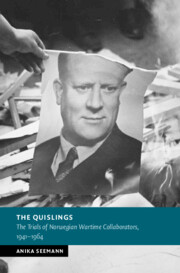Book contents
- The Quislings
- New Studies In European History
- The Quislings
- Copyright page
- Contents
- Figures
- Acknowledgements
- Note on Translations
- Abbreviations
- Introduction
- Chapter 1 Occupation
- Chapter 2 Transition
- Chapter 3 Foundation
- Chapter 4 Adjudication
- Chapter 5 Limitation
- Chapter 6 Interpretation
- Chapter 7 Correlation
- Conclusion
- Book part
- Bibliography
- Index
Conclusion
Published online by Cambridge University Press: 12 December 2024
- The Quislings
- New Studies In European History
- The Quislings
- Copyright page
- Contents
- Figures
- Acknowledgements
- Note on Translations
- Abbreviations
- Introduction
- Chapter 1 Occupation
- Chapter 2 Transition
- Chapter 3 Foundation
- Chapter 4 Adjudication
- Chapter 5 Limitation
- Chapter 6 Interpretation
- Chapter 7 Correlation
- Conclusion
- Book part
- Bibliography
- Index
Summary
This conclusion briefly summarises the main findings of the book. It emphasises that the aim of the book is not to assess the trials from a legal or moral standpoint, but rather to seek to understand what drove different actors at different stages of their implementation. In doing so, the conclusion argues that while the Norwegian post-war reckoning was largely contained in legal form, this did not make the process of coming to terms with the past any easier or less controversial than comparable processes seen in other European countries.
- Type
- Chapter
- Information
- The QuislingsThe Trials of Norwegian Wartime Collaborators, 1941–1964, pp. 298 - 304Publisher: Cambridge University PressPrint publication year: 2024

